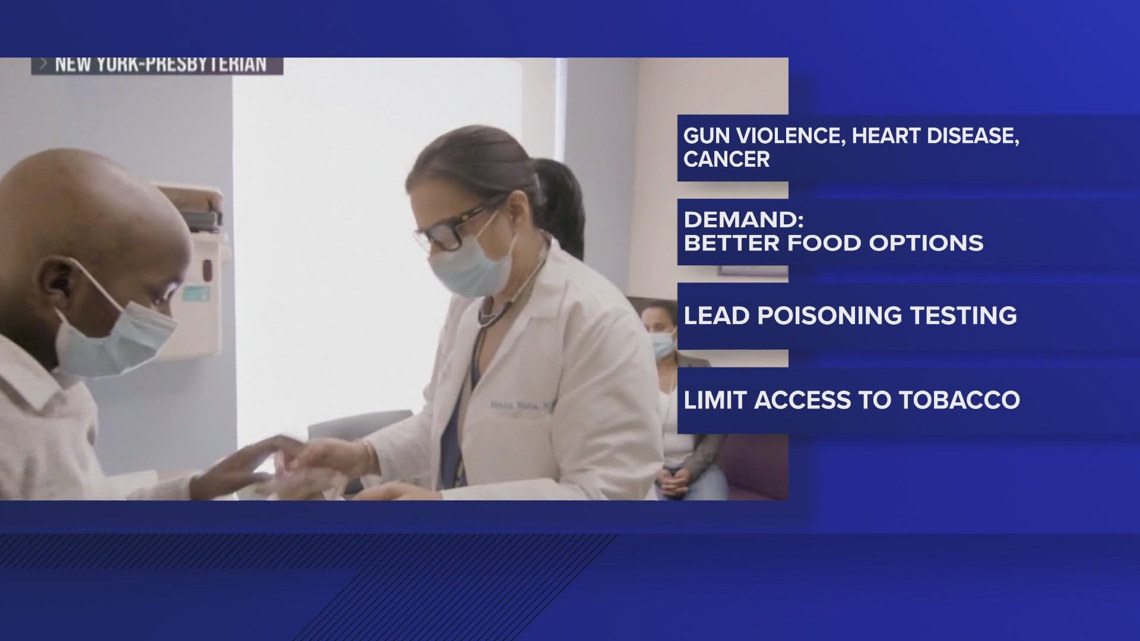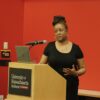
‘Despite the city of Cleveland’s official declaration of racism as a public health crisis, meaningful progress has been slow,’ community leaders said Monday.
CLEVELAND — The Center for Black Health & Equity is publicly calling out city of Cleveland leadership, accusing them of being slow to address disproportionate health outcomes for the city’s Black community. They held a press conference Monday at Cleveland City Hall demanding immediate change.
“Despite the city of Cleveland’s official declaration of racism as a public health crisis, meaningful progress has been slow and our voices have been ignored,” said Ashley Hebert, senior policy manager for The Center for Black Health & Equity. She was joined by representatives from Northeast Ohio Black Health Coalition, Cuyahoga County Progressive Caucus, and Cleveland Lead Advocates for Safe Housing.
The speakers talked about how gun violence, heart disease, and cancer are disproportionately affecting Cleveland’s Black community. They believe public health policy isn’t moving fast enough to address healthy food options for children or testing kids for lead poisoning. They also want something done about children’s ease of access to flavored tobacco and menthol cigarettes.
“It’s about ensuring that every Cleveland resident, regardless of their zip code, has a fair shot at living a long and healthy life,” said Bishop Chui, a representative for the Cuyahoga County Progressive Caucus. “These disparities demand bold, immediate action, yet rather than fostering collaboration, critical public health legislation has been stalled. This obstruction does not just delay progress on legislation; it also perpetuates the inequities and suffering that so many of our residents endure daily.”
Chui and the other speakers ultimately called for city leader to strengthen efforts towards data-driven policies to address inequities, improve outcomes, and promote health equity for all residents. 3News asked Cleveland Director of Public Health Dr. David Margolius what he made of the claims at the press conference.
“There’s a huge disparity in life expectancy between Black residents and white residents in the city of Cleveland,” he admitted. “In neighborhoods that are predominantly Black in Cleveland, the life expectancy is like in the mid-60s compared to the high-80s in the suburbs. So we absolutely need to act together to implement policy that reduces our smoking rate, reduces our lead poisoning rate, obesity, hypertension — all the issues that are disproportionately affecting Black residents in Cleveland.”
Margolius then explained that because the leading preventable cause of cancer in the country is smoking, the Cleveland Department of Public Health has created smoking cessation classes and a smoking cessation network in the city to help reduce smoking rates. He’s also optimistic that his department and Cleveland City Council can get some policies passed.
“We’re partnering with city council to look at some different legislation that would regulate how many tobacco retailers there are in the city,” he explained. “City council has expressed interest to work with us on inspecting and regulating the same way we do with restaurants. So how do we go in there, make sure that a cashier isn’t selling cigarettes to a 19-year-old because the law is 21 and up? How do we make sure that they’re not marketing the flavored products directly to kids outside of schools? That’s something that the health department doesn’t do now, but with legislation we’ll be able to do that.”
We then visited Cleveland City Council President Blaine Griffin for his reaction.
“I think that we’ve made measurable progress,” he said. “I think that we’ve done a lot of good things policy-wise. I actually happen to agree with them about lead testing.”
But when it came to tobacco, he believes people will always find a way to get their hands on it.
“You want to do this in the city of Cleveland, but then you can go right across the street where I live at in Shaker and Cleveland Heights and buy whatever menthol tobacco you want,” he noted. “I will also tell you that we have times when we’ve seen people that might try to unleash an illegal market for these goods.”
Griffin says at the end of the day, the community should be focusing on public education, and not just policy.
“We’ve got to do a better job of educating,” he said. “If we don’t educate, if we don’t lift as we climb and build these policies, then they’re going to fall on deaf ears.”


